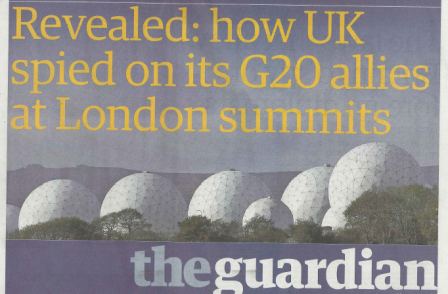
The Daily Mail today stepped up its attack on The Guardian over its publication of leaked information about UK spying activities describing it as “the paper which helps Britain’s enemies” in a leader column.
And it accused the BBC of ignoring comments made by the head of MI5 condemning leaks about the activities of GCHQ.
Without naming The Guardian, MI5 chief Andrew Parker said on Tuesday night that "it causes enormous damage to make public the reach and limits of GCHQ techniques…
"Such information hands the advantage to the terrorists. It is the gift they need to evade us and strike at will."
The comments have been interpreted as an attack on extensive revelations made by US National Security Agency whistleblower Edward Snowden via The Guardian about US and UK spying methods.
The Mail devoted more than four pages, including its front page, to criticism and attacks on The Guardian today.
A comment piece from Douglas Murray, of the Henry Jackson Society, said: “What this newspaper has indulged in over this Snowden affair truly IS a ‘gift’ to terrorists as well as to every one of this country’s enemies – and all because of the schoolboy vanity of a few left-wing journalists.”
And in a leader column the Mail said that voicemail hacking, payments to public officials and the paper’s own coverage of Ralph Miliband all pale campared to the accusation which it said was levelled against The Guardian.
“It is impossible to imagine a graver charge against a newspaper than that it has given succour to our country’s enemies and endangered all our lives by handing terrorists ‘the gift they need to evade us and strike at will’.”
Arguing that a line has to be drawn between civil liberties and the interests of national security, the Mail said: “We believe the Guardian, with lethal irresponsibility, has crossed that line by printing tens of thousands of words describing the secret techniques used to monitor terrorist.
“Such is certainly the view of UK national security adviser Oliver Robbins, who says the paper has ‘already done real damage’ while the information it still holds is likely to ‘lead directly to widespread loss of life’.
“Indeed, so incendiary are these documents that British agents have had to be moved for their protection.
“Yet, almost as astonishing as the BBC’s reticence, the editor of the Guardian now says he will continue to release the material, arguing that he will take care to publish anything that endangers lives.
“But, in the name of sanity, how can he know? He’s a journalist, not an expert on security.”
Ten days after the Mail described the late Ralph Miliband as “the man who hated Britain” it said: “True, he hated so much about this country that he wanted a workers’ revolution to overturn everything from the monarchy to Parliament…But he fought for Britain in the war. And never once, as far as we are aware, did he give practical help to our enemies…
“Isn’t that a great deal more than can be said for the Guardian?”
Daily Mail columnist Stephen Glover quoted a Whitehall source who said the Snowden leaks had caused “the greatest damage to Western security in history” and accused Guardian editor Alan Rusbridger of “stupendous arrogance and presumption”.
But he added: “Despite everything I believe he is a decent man. I urge him to descend from the misty slopes of Mount Olympus which he inhabits and put an end to this shamefull business."
Writing in The Guardian today, former chairman of Index on Censorship John Kampfner suggested attacks on the paper are fuelled by its refusal to endorse a new system of press regulation which has the backing of most other publishers.
He said: “There is another possible explanation for the silence and sneers that have greeted the Guardian's coverage of the Snowden story: Leveson. Most rivals on Fleet Street think this paper has also been selective in its embrace of freedom of expression, siding as it did with advocates of greater regulation of the British press. This is payback time.”
Speaking to the World at One yesterday, Rusbridger said: “Of course if you are on the security side of the argument you want to keep everything secret and you don’t want to take part in any debate and you don’t want the press or anyone else writing about it.
“You would have to be a terrorist who didn’t know how to tie his shoelaces not to believe that people were watching things on the internet and scooping up telephone calls. I don’t think some of this will come as a great surprise to terrorists.”
Email pged@pressgazette.co.uk to point out mistakes, provide story tips or send in a letter for publication on our "Letters Page" blog
